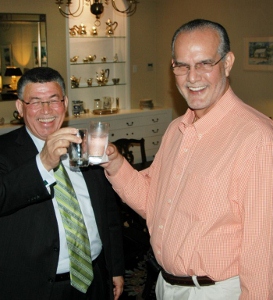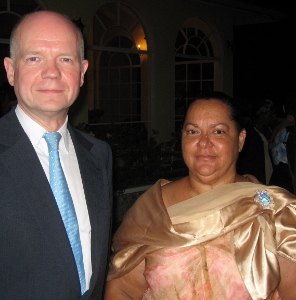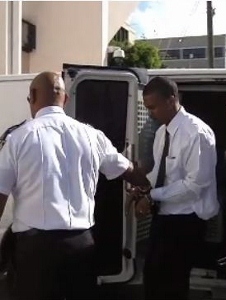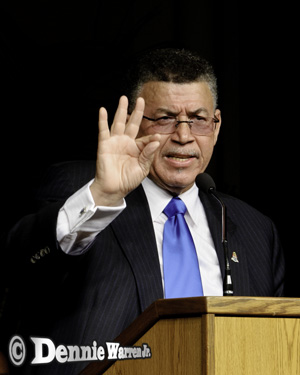Archive for February 2nd, 2012

Customs set for 100% container inspection
 (CNS): The battle against the importation of illegal goods and duty dodgers is about to get a whole lot easier for local customs officials. With the arrival in Cayman of the Heimann Cargo Vision Mobile (HCVM) x-ray inspection system every single container imported into and exported from the islands will be inspected. The non -intrusive scanner is only days away from becoming fully operational paving the way for a new freight security initiative that customs will introduce this month as part of routine import and export procedures, Customs authorities said. Collector of Customs, Carlon Powery said he was delighted that the department would be able to meet a long standing goal.
(CNS): The battle against the importation of illegal goods and duty dodgers is about to get a whole lot easier for local customs officials. With the arrival in Cayman of the Heimann Cargo Vision Mobile (HCVM) x-ray inspection system every single container imported into and exported from the islands will be inspected. The non -intrusive scanner is only days away from becoming fully operational paving the way for a new freight security initiative that customs will introduce this month as part of routine import and export procedures, Customs authorities said. Collector of Customs, Carlon Powery said he was delighted that the department would be able to meet a long standing goal.
“So far, it was logistically impossible to inspect every container manually, given the numbers,” he said. “I am now delighted that we can meet our goal of one hundred percent inspection with the extra boost the new equipment provides. But more importantly, we are improving our border management capacity for security, trade facilitation and social protection.”
Smiths Detection won the bid to supply the government with the non-intrusive inspection system (NIIS) and the HCVM system is currently being tested here in Cayman following tests in the factory in Europe.
Four more conventional x-ray inspection systems will also be arriving shortly, officials revealed, which will be installed at the Airport Post Office, the customs courier service facility, the airport transit warehouse and inside the inland depot warehouse.
With a new container traffic flow design as well as the new scanning procedures at the Cargo Distribution Centre, officials expect that traders will continue to receive cleared goods in a timely manner. The project coordinator Jeff Jackson said the system will be a boon to end-users, the majority of which are law-abiding customers. But the scanner will enhance customs’ border control capabilities and guard against terrorism without disrupting traffic flow, Jackson added, as the system can also detect the presence of radioactive materials inside containers or vehicles.
“These X-ray inspection systems are specifically designed to scan mail, baggage, pallets, trucks, cars, watercraft and shipping containers,” he said. “They will dramatically upgrade our ability to identify suspect goods including weapons, narcotics and other types of contraband. It will also enable quick, accurate and reliable verification of manifests in unopened loads, reducing the need for manual inspection.”
Training is now underway for end users including truckers and local traders to sensitise them about radiation and associated risks as well as to address any concerns about the system which Jackson said is used extensively worldwide. Customs personnel are also being trained in the operations and maintenance of the systems.
The computer controlled, remotely-driven mobile HCVM scanner emits radiation less than the quantity a patient gets at a dentist’s office, explained Peter Southwood, head of the installation team. A tightly controlled beam rapidly and fully scans all the contents of the inspected item, such as containers which will remain on the truck transporting them, he said.
As the scan progresses, the operator receives a high-quality radioscopic image of the vehicle inspected and its contents. It eliminates the need to open the containers since it enables complete inspection of trucks and containers, regardless of load density, Southwood explained.,
A high concrete block wall built to border one side of the scanning bay at the CDC merely provides additional protection, as a precaution, for persons behind the wall when the system is in use. With a stationary truck and mobile scanner, the trucker will be out of his vehicle when the scan is underway, getting back on only after the scan is complete, the expert added.

TCI government recovers $9.29M in stamp duty fraud
 (CNS): The government of Turks and Caicos has been awarded a judgment of $9.29 million involving the Emerald Cay private island property, following a ruling by Chief Justice Edwin Goldsborough on Wednesday. The court ruled that Tim Blixseth, helped conceal the true value of the retreat and underpaid stamp duty on the deal. Attorney General Huw Shepheard said the judgment against Emerald Cay Ltd. and Worldwide Commercial Properties Ltd. replaces an interim award of $1.25 million because of stiffer penalties.
(CNS): The government of Turks and Caicos has been awarded a judgment of $9.29 million involving the Emerald Cay private island property, following a ruling by Chief Justice Edwin Goldsborough on Wednesday. The court ruled that Tim Blixseth, helped conceal the true value of the retreat and underpaid stamp duty on the deal. Attorney General Huw Shepheard said the judgment against Emerald Cay Ltd. and Worldwide Commercial Properties Ltd. replaces an interim award of $1.25 million because of stiffer penalties.
"We are delighted to have obtained this judgment, which underlines the commitment the government has to ensuring stamp duty is paid, and to pursue those who do avoid stamp duty," he said.
The TCI interim government said the defendants paid $28 million for Emerald Cay while land transfer documents recorded the sale at only $10 million. It accused them of conspiring to avoid paying $2.73 million.
According to a report on Bloomberg Blixseth lawyer Michael Flynn contends that it was the seller who was at fault.
The Emerald Cay property has a nine-bedroom mansion with man-made sandy beach, several docks and a retractable bridge linking it with the island of Providenciales.

Ritz-Carlton to train CS
 (CNS): The deputy governor says that the Cayman Islands government has enlisted the assistance of the Ritz-Carlton to help train public sector workers. In a letter to the civil service on Wednesday as he took up his new post Franz Manderson spoke about some of the forthcoming changes and plans for the public sector and said that the Ritz would help in the goal to enhance customer service and it would also be helping to develop an orientation programme for new workers. Manderson also spoke about the need for improved communication between management, staff and customers, using both traditional and modern methods like government's Facebook page.
(CNS): The deputy governor says that the Cayman Islands government has enlisted the assistance of the Ritz-Carlton to help train public sector workers. In a letter to the civil service on Wednesday as he took up his new post Franz Manderson spoke about some of the forthcoming changes and plans for the public sector and said that the Ritz would help in the goal to enhance customer service and it would also be helping to develop an orientation programme for new workers. Manderson also spoke about the need for improved communication between management, staff and customers, using both traditional and modern methods like government's Facebook page.
Manderson said his vision called for a well-informed civil service that is knowledgeable about what is happening in government and willing to share their perspectives with management. He also announced the start of his weekly meetings with chief officers to develop a “collective sense of responsibility” in the service.
He added that other priorities included encouraging staff to understand their responsibilities and improve customer service.
“Our partner in these endeavours will be the Ritz-Carlton, a worldwide leader in customer service,” the deputy governor revealed. “The Ritz-Carlton will help us work towards the goal of exceeding customer expectations, in addition to facilitating the development of a comprehensive service-wide staff orientation programme.”
Manderson told his new army of some 3,000 plus workers that current times require tough decisions and changes to the way the service operates. “We do ourselves no favours if we shy away from this fact,” he added.
The new deputy governor said he would soon start departmental visits in all three islands, where he looked forward to meeting staff and learning more about their agencies as well as sharing his agenda and priorities for change.
See the deputy governor’s full letter to civil servants below.

Civil servants bid farewell to old boss
 (CNS): After more than 36 years the civil service, Cayman’s first deputy governor retired this week. As the public sector and government welcomed Franz Manderson and several new senior officers to the new government administration team, Donovan Ebanks was given a fond farewell at Government House Wednesday. “Not bad for a North Side boy who didn’t wear shoes to school until I was 12, and whose family didn’t have electricity until I was in university,” Ebanks told the gathering as they spoke about his long career in public service. Senior officers, colleagues, relatives and friends celebrated his career and spoke of the many milestones he had reached as well as the challenges he overcame – from budgets to hurricanes.
(CNS): After more than 36 years the civil service, Cayman’s first deputy governor retired this week. As the public sector and government welcomed Franz Manderson and several new senior officers to the new government administration team, Donovan Ebanks was given a fond farewell at Government House Wednesday. “Not bad for a North Side boy who didn’t wear shoes to school until I was 12, and whose family didn’t have electricity until I was in university,” Ebanks told the gathering as they spoke about his long career in public service. Senior officers, colleagues, relatives and friends celebrated his career and spoke of the many milestones he had reached as well as the challenges he overcame – from budgets to hurricanes.
“It’s not about what I accomplished, it’s all about the shared effort,” he said of a career that spanned four decades
After spending 19 years with the Public Works Department, Ebanks became a leading civil servant. As deputy chief secretary he oversaw Cayman’s protective services, including heading the National Hurricane Committee, and he finished his career as the most senior civil servant in the country.
As the son of a politician (the late MLA Craddock Ebanks), he understood the two sides of the coin, he said. Renowned for being frugal, Ebanks said he felt it was appropriate "to spend government’s money as if it was my own".
Governor Duncan Taylor wished him a happy retirement and said he had fulfilled his role very well. Meanwhile, the premier said there had been tremendous changes since Ebanks’ career began in 1975.
“There is a lot we have done right, and the best homage to Donnie would be to maintain such high standards,” McKeeva Bush added.
Ebanks’ parting advice to the civil service was to put country before self and work hard, then they would eventually be rewarded.

Minister gets ‘bright’ idea at Caribbean forum
 (CNS): The concept of a solar powered water plant caught the attention of Cayman’s deputy premier recently at the Seventh Ministerial UK-Caribbean Forum in St George’s, Grenada. Juliana O’Connor-Connolly, who is also the public works minister, said of the many issues discussed at the forum she was "particularly interested in the difference stages of nation building some countries were in” and pointed to St Kitts and its efforts to implement a water unit that was almost all solar powered.
(CNS): The concept of a solar powered water plant caught the attention of Cayman’s deputy premier recently at the Seventh Ministerial UK-Caribbean Forum in St George’s, Grenada. Juliana O’Connor-Connolly, who is also the public works minister, said of the many issues discussed at the forum she was "particularly interested in the difference stages of nation building some countries were in” and pointed to St Kitts and its efforts to implement a water unit that was almost all solar powered.
“This would be great for the Cayman Islands and I am hoping to take a technical team there later this year to examine the feasibility of this water project,” she said. “If we can apply it to the Cayman Islands, it would save money and greatly assist the farming community."
Representing Cayman on behalf of the premier at the regional event, O’Connor-Connolly denied that it was just a talking shop. “It was good to convene with my political colleagues from the Caribbean and the UK who shared the same goals for enhancement of partnership through the region,” she said, adding that delegates rolled up their “respective sleeves and the deliberations were fruitful and productive.”
Economic issues, food and border security, climate change and foreign policy matters were on the agenda, as well as the Air Passenger Duty (APD) which remains a controversial issue as the rates are considerably higher for British passengers heading to the Caribbean than those to competitor destinations in the US.
The tax on economy long-haul flights of more than 6,000 miles will rise from £85 (US$132) to £92 (US$143) per person in April this year. Caribbean governments, the Caribbean Tourism Organization (CTO) and the Caribbean Hotel and Tourism Association (CHTA) say the four band APD system has a negative impact on what was already a fragile regional economy
The tax is considered discriminatory against the Caribbean and places the Caribbean at a disadvantage in relation to other tourism destinations. William Hague the UK foreign secretary has agreed to further talks about the tax but has made no commitment about reductions.
He did affirm the strong ties however between the UK and the Caribbean and his desire to “renew the relationship” between the countries.
“The factthat he reiterated an open-door policy for Caribbean nations was especially comforting,” O’Connor-Connolly said.

Armed burglary terror
(CNS): An elderly couple who are both in their 80's were terrified in the early hours of this morning by three masked, armed intruders who demanded cash at gunpoint. Police said Thursday that the couple were woken up at around 2:30am to discover the men in their home in Magellan Quay, one of whom was in possession of what appeared to be a firearm. The RCIPS also revealed that one of the marked police vehicles responding to the aggravated burglary was involved in a collision with another vehicle near Jacques Scott at the junction of Shedden Road in George Town on the way to the scene. The driver of the vehicle that hit the police car was arrested on suspicion of DUI.
West Bay detectives investigating the burglary are appealing for information. They said the couple, who were not hurt but very shaken by their ordeal, were unable to give a complete description. The three men all had their faces covered and were wearing dark clothing.
No shots were fired during the incident and one of the elderly residents at the house was able to get to the burglar alarm, after which the three intruders ran from the house. Police said it has not yet been established what was stolen before the burglars took flight.
Meanwhile, the officer injured in the crash in George Town was taken to hospital, where she is still being treated, but her injuries are not believed to be serious. At the time of the smash the police officer was given a breath test and passed. The other driver, who refused to take the test, was arrested on suspicion of DUI and bailed to appear at court at a later date.
Police enquiries in to the burglary are on-going and anyone who has any information which could assist the police is asked to call West Bay CID on 949-3999, the RCIPS Tip-Line on 949-7777 or Crime Stoppers 800-8477 (TIPS).
GM mosquito release not transparent, say scientists
(CNS): A group of independent scientists say that the release of genetically modified mosquitoes in the Cayman Islands, Malaysia and Brazil was not sufficiently transparent or properly regulated which risks undermining the research of what they say is promising technology. The German scientists published a paper on Monday based on their analysis of the insect release which found a deficit in the scientific quality of regulatory documents and a general absence of accurate experimental descriptions available to the public before the release started.
A team of scientists from the Max Planck Institute for Evolutionary Biology in Plön, Germany said that accurate scientific information about “designer insect” releases is being highly restricted throughout the world, especially before those releases begin.
Genetically modified mosquitoes were released in EAst End on Grand Cayman in 2009 as part of a research study on the eradication of dengue fever by the UK-based company Oxitec in partnership with the Mosquito Research and Control Unit. Although there was some local notification in the district and a GIS TV programme was produced about the release the experiment remained very low profile with very little information about the project in the public domain.
The independent scientists said in their report that the possibility of the GM insects’ offspring biting humans was never addressed. The pointed out that the males were partly and not completely sterile, despite claims to the contrary, and as a result this obvious question was conspicuously ignored despite the probability that the transgenic daughters of the released males will bite humans.
However, the German scientists explained that this did not mean the technology was inherently dangerous but it would impact public confidence in regulators if the discussion of scientifically plausible concerns are absent. The analysis found no publically available documents that scientifically considered possible human health impacts of being bitten by transgenic females.
The independent scientists argued in their paper for transparency to help promote acceptance of what they said was promising technology.
During the research into the Cayman Islands release it was established that there was no enacted legislation relating to either the release or transportation of the living genetically modified organisms.
Bill Petrie the director of the MCRU told CNS recently that said that the unit had to obtain a permit from the Department of Agriculture for the importation of the mosquito eggs and release of the progeny. He also stated that the Department of Environment was also consulted.
The scientists noted however that community engagement and consent for such a project requires greater transparency. The report said that the general lack of accurate available information before starting the release was disappointing as it should have been widely circulated before the experiment. The need for high-quality community engagement, particularly in early releases, has repeatedly been argued as essential by expert scientists.
“It is rather uncontroversial to state that in the absence of meaningful and accurate descriptions being made widely available, communityengagement cannot credibly be said to have occurred,"‘ said Dr Guy Reeves one of the scientists from the Max Planck Institute. “If those that conducted the trials cannot produce pre-release written descriptions, then they need to explicitly state why meaningful community engagement and consent might not be necessary for experimental releases into towns and cities.”
The scientists said in their paper that given the enormous human burden of diseases like dengue fever and crop loss from insect attack it is important that new control techniques are developed and that field trials are essential.
"However, we need an informed public to ensure that experimental testing of this potentially valuable technology can be given a fair chance and that testing does not needlessly provoke public mistrust,”added Reeves.
He said that avoiding the kind of questionable practices which characterized the commercial development of genetically modified plant is likely to be important in this area of research.
See related stories below
Gm-mozzies-may-have-reproduced
Gm-mozzies-didnt-linger-says-cayman-control-unit

Jeffers waits on judge
 (CNS): The future of 28-year-old Raziel Jeffers is now in the hands of Justice Charles Quin after the trial for the murder of Marcus Ebanks drew to a close yesterday. The defence team presented their closing argument to the court on Wednesday morning, stating that the crown’s key witnesses in the case were discredited, leaving the judge with “a number of troubling questions” that could only be resolved in favour of the defendant. As he summed up the position of his client, who denies being at the scene of the shooting in Bonaventure Lane in July 2010, Peter Champagnie said the evidence presented by the crown raised serious doubt which should lead the court to find Jeffers not guilty on all counts.
(CNS): The future of 28-year-old Raziel Jeffers is now in the hands of Justice Charles Quin after the trial for the murder of Marcus Ebanks drew to a close yesterday. The defence team presented their closing argument to the court on Wednesday morning, stating that the crown’s key witnesses in the case were discredited, leaving the judge with “a number of troubling questions” that could only be resolved in favour of the defendant. As he summed up the position of his client, who denies being at the scene of the shooting in Bonaventure Lane in July 2010, Peter Champagnie said the evidence presented by the crown raised serious doubt which should lead the court to find Jeffers not guilty on all counts.
During his closing speech, however, Andrew Radcliffe, QC for the crown, said that Jeffers had the means, motive and opportunity to “carry out the cowardly and incompetent act” and was one of the two masked gunmen that opened fire indiscriminately on the young men congregated in the yard on the fateful night.
He said that the evidence of Adryan Powell, the teenager who was injured in the shooting and now confined to a wheelchair, alone was enough to convict the West Bay man but he said that was bolstered by the evidence of Megan Martinez, Jeffers’ girlfriend who had revealed a damning confession made to her by the defendant.
Radcliffe claimed that in turn her evidence was bolstered by the telephone records that tracked Jeffers on the night in question, and standing alone was the gunshot residue (GSR) found on cigarette papers in the suspect’s pocket at the time of his arrest early the next morning.
The crown also put forward evidence of a motive relating to a personal feud between Jose Sanchez, who it claims was Jeffers' intended target that night but who had escaped unscathed. In addition, it pointed to evidence of the factional animosity between the two men who were on opposing sides of the so-called war between the Birth Tree Hilland Logwoods gangs.
Radcliffe emphasised that Powell’s certain identification of Jeffers when the mask slipped from his face after he had opened fire in the yard was much more than fleeting. He said the lighting was sufficient, it lasted some four seconds. Powell knew and recognized the defendant and, as was the evidence of even the defence witnesses, the teenager was awake and alert, despite receiving multiple gunshot wounds. Above all, the lawyer said, there was no reason at all for him to lie leaving the real culprit at large.
Radliffe said that the delay in Powell’s identification of Jeffers by only a week was understandable given the circumstances: the teenager was heavily medicated during the first statements and, more importantly, he was afraid. When he discovered his own fate as a result of the traumatic event and that his friend Marcus was dead, it was understandable that in his own words he “didn’t care anymore” and came forward.
The QC emphasised the evidence of Martinez, who, while he admitted was a truculent witness that had originally lied to the police, had endured a violent relationship with the defendant. He said she was dependent on him and his family as a young teenage mother. Radcliffe said it was not until she felt that Jeffers was no longer a threat to her that she could come forward. He said there was no evidence to show that Martinez had falsely advanced the confession and that she “would have to have a powerful motive for lying”, adding that her account was also supported by the telephone evidence.
Speaking for Jeffers, however, Champagnie entirely disagreed stating that Martinez’ motive for lying was malice.
When she went to the police, Jeffers had evicted her from the apartment they had shared and taken up with another woman. He said that “hell hath no fury like a woman scorned” as he pointed to the inconsistencies and lies she had told in statements and in court. He also noted that when he had put suggestions to her that she was lying about the confession, she had agreed,despite the claims by the crown that it was the way the questions were asked that had led to confusion.
Champagnie said that Martinez was also an erratic and irrational witness, demonstrated by her behaviour in the court, and was thoroughly discredited.
The visiting Jamaican defence attorney dismissed the GSR evidence as a result of the high risk of transfer contamination. He said the phone records proved nothing as they couldn’t pinpoint his client to any location, even if the crown had been able to demonstrate that the phone was in his client’s possession for the time in question.
He also dismissed the motive as he said even Sanchez had denied any animosity between himself and the defendant.
Focusing on the evidence given by Powell, the crown’s key witness, he also claimed this was both poor and discredited. The lawyer said the teenager had lied about when he met Jeffers. He also stated that the circumstances surrounding when Powell had supposedly seen the gunman without a mask were challenging, presenting him with nothing more than a fleeting glance. Above all, his decision to wait a week to point the finger at the defendant raised serious doubt about its veracity.
Champagnie pointed to evidence that the boys were all drinking Hennessey, Heineken and smoking ganja just before the shooting, which would have impaired the teenager’s ability to identify his assailants as he lay wounded on the ground, shot multiple times including once in the face.
Given the discredited witnesses, the defence attorney said there must be serious doubt about his client’s guilt that would lead to a not guilty verdict.
Justice Quin said that with more than 50 prosecution and four defence witnesses, there was a considerable amount of evidence for him to consider and he would need some time but would deliver his verdict as soon as possible.
Jeffers is facing a mandatory life sentence for the murder of Ebanks should he be convicted. He is also charged with four counts of attempted murder and possession of an unlicensed firearm, convictions for which would automatically follow if the judge finds him guilty of murder given the circumstances of the shooting. If Jeffers is acquitted, however, it is unclear if he will be immediately released from custody as there are two other murder charges pending against him which are likely to be dropped in the face of a not guilty verdict in this case.
Although there were two masked gunmen who perpetrated the shooting on the 8 July 2010, Jeffers was the only suspect ever charged in the case.

Bush: CS bosses must work with elected government
 (CNS): As the new deputy governor officially took up his post Tuesday, along with a number of other senior civil servants starting new top jobs, the premier said the new team “must work most closely” with the elected government. In a message to all civil servants McKeeva Bush said that the challenge would be “how to best provide within available and earned resources, for the betterment of the common good.” Following his criticisms of "bureaucracy" and "too much good governance"at the recent CBO conference, Bush welcomed the new public sector bosses and said he believed that Franz Manderson’s tenure as deputy governor would be a “progressive one.” (Photo Dennie Warren Jr)
(CNS): As the new deputy governor officially took up his post Tuesday, along with a number of other senior civil servants starting new top jobs, the premier said the new team “must work most closely” with the elected government. In a message to all civil servants McKeeva Bush said that the challenge would be “how to best provide within available and earned resources, for the betterment of the common good.” Following his criticisms of "bureaucracy" and "too much good governance"at the recent CBO conference, Bush welcomed the new public sector bosses and said he believed that Franz Manderson’s tenure as deputy governor would be a “progressive one.” (Photo Dennie Warren Jr)
“We know Mr Manderson will be a great asset as we strive to attain, and sustain, the dynamism and reliability, the insight and the foresight, that are necessary to establish peace, order and good government amongst and for the people of the CaymanIslands,” The premier said in his message, which was circulated throughout the service.
Bush said he believed that civil servants could look forward to the enhancement of their value under Manderson’s leadership. “You may expect a heightened recognition of the value of the great service you all offer to the public of the Cayman Islands, as well as to our many short- and longer-term guests. He will no doubt call on you to keep to or exceed those standards,” he told government workers.
The premier described the new deputy governor as “dedicated, capable, and hard-working” as he wished him every success in the face of what he called “our emerging challenges” and the “renewed emphasis on pulling together for the common good.”

Dumping Uncle Sam for tax reasons not so easy
(CNS Business): US law bars people who relinquished their US citizenship for tax purposes from entering the country or obtaining a visa. They are also subject to an exit tax on everything they own as if they had sold it all, tax experts said at a seminar yesterday on US immigration and expatriation tax rules. Tax would even have to be paid on property owned outside the US, although the first US$600,000 of gain was exempt. If an individual has filed their tax returns for seven years they can proceed with relinquishing their US citizenship, but the process involves lengthy form filling, an interview at the US embassy, reflection time for the individual to seriously consider the implications of their actions and then a decision process by the US authorities. Read more on CNS Business